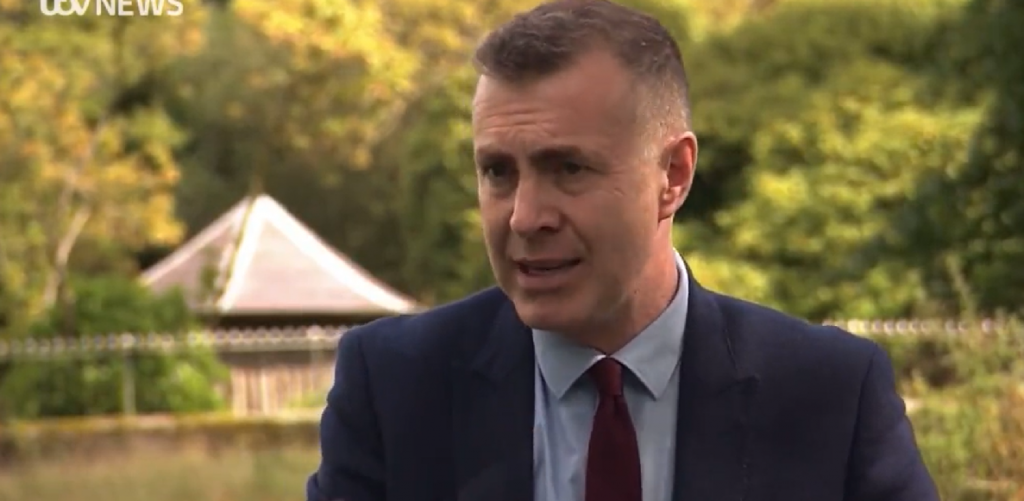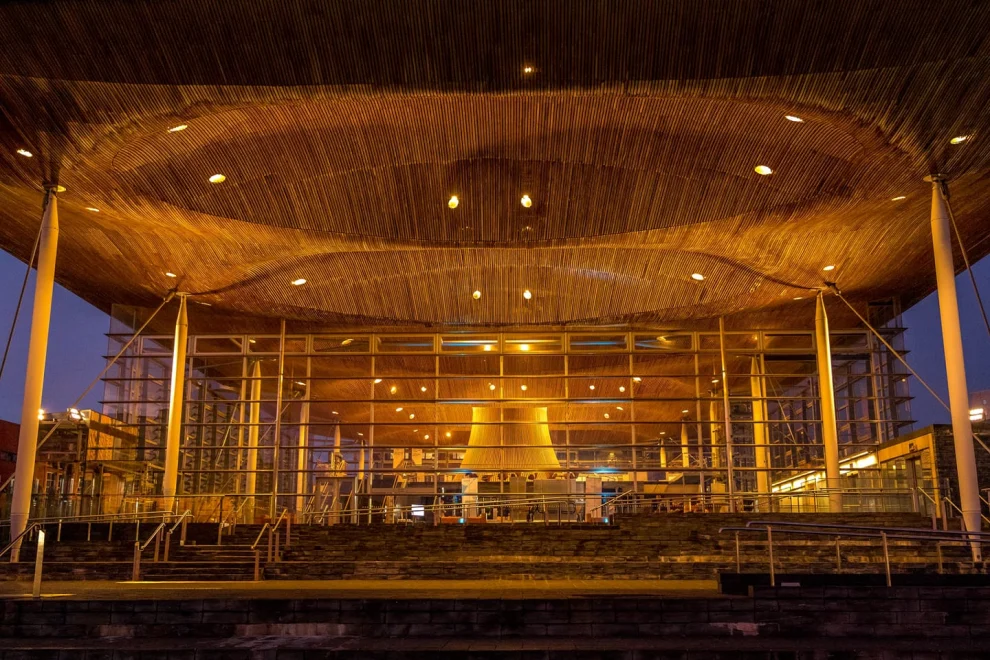ON MONDAY (November 22), Labour and Plaid Cymru announced an agreement to stitch up the Senedd for the next three years.
Amid much self-congratulation, Adam Price and Mark Drakeford hailed their success at reaching an agreement.
Labour promises to deliver the bits of its Manifesto with which Plaid agrees and considers delivering the bits of Plaid’s Manifesto that it finds unobjectionable.
WHAT THEY SAY

A joint press release says: “The agreement is a joint policy programme covering 46 areas, ranging from the delivery of free school meals to all primary school pupils; a commitment to take immediate and radical action to address the second homes crisis, to long-term reform of the Senedd.
“This is a new form of political working arrangement. The two partners – the Welsh Government and the Plaid Cymru Senedd Group – will work together to jointly develop and oversee the delivery of the policies covered by the agreement over the coming three years.”
First Minister Mark Drakeford said: “The Welsh Government has an ambitious Programme for Government, which it will deliver over this Senedd term. But we do not have a monopoly on good ideas, and we will work with progressive parties where we have shared and common interests to benefit people in Wales.
“This Co-operation Agreement brings the Welsh Government and Plaid Cymru together to respond to some of the most pressing issues facing Wales today, such as climate change and the energy and cost-of-living crisis.
“We can achieve more for people in Wales by working together, and the Co-operation Agreement is both a response to the external challenges we face and a chance to build on the opportunities in our future. It will also help us secure a stable Senedd over the next three years, capable of delivering radical change and reform.
“These commitments build on our shared values of social solidarity, a sustainable planet and a vibrant democracy.”
Adam Price, Leader of Plaid Cymru, said: “Almost a quarter of a century ago, people in Wales voted for self-government for Wales, with a promise of a new type of politics.
“They placed their trust in a new democracy with an instruction to work differently – inclusively and co-operatively.
“The challenges we face require real ambition to deliver radical ideas. The fallout from leaving the European Union, the legacy of the pandemic, and the UK Government’s determination to erode the Senedd’s powers all increase the need for transformational change.
“Taken together, the bold policy pledges will unite Wales and benefit every generation, from all primary school pupils receiving free school meals to a national care service, free at the point of need.
“I am pleased this pioneering Co-operation Agreement is founded on common ground on a range of issues that will make a long-lasting difference to people’s lives.”
As part of the agreement, a publicly owned energy company for Wales could be created to encourage community-owned renewable energy generation; there will be further investment in flood defences and new measures to strengthen the Welsh language and support for young people’s mental health.
This is a bespoke agreement – it is not a coalition; Plaid Cymru Members will not be joining the Welsh Government as Ministers or Deputy Ministers. Plaid Cymru will appoint a designated lead member for the agreement. Committees of Welsh Ministers and Plaid Cymru designated members will be established to agree on issues covered by the Co-operation Agreement.
Funding has been put in place as part of the Co-operation Agreement and reflected in the draft Budget published in December.
All issues outside the Co-operation Agreement will be handled in the normal course of political engagement.
THE FALL OF ADAM:
FROM HIGH IDEALS TO BASE REALITY

Before May’s election, Adam Price spoke about his “despair” at the prospect of five more years of Labour Government, of Labour’s failures in Wales, and how Wales deserved better.
It turns out what he meant was that he was happy to support Labour in exchange for many things Labour said it was going to do anyway.
The prospect of last week’s Welsh Food Bill (supported by Plaid) ever hitting the statute book has taken a massive step backwards. Instead, there’s likely to be a continuation of the current Welsh Government strategy of discussing whether to consult before talks about holding talks.
Labour hailed its thirty seats in May’s election as a massive endorsement for its policies. Voters rejected those policies in large parts of Wales, where the fight for seats was between Plaid and the Conservatives.
Bolting strong anti-Labour sentiment in traditionally Plaid supporting areas did not end well for Plaid after the One Wales Government.
It is hard to see the crustier members of the Party of Wales reconciling themselves to backing Labour in a Senedd many of them regard as not speaking for their concerns about language, culture, and rural Wales.
Setting unionism aside, the divide between rural Plaid voters and the Conservatives is a lot narrower than Plaid in Cardiff Bay would like to accept.
However, the signs that the parties would reach an agreement have been obvious for some time, notably at First Minister’s Questions.
Over recent weeks, Adam Price’s questions to Mark Drakeford played out like a charade.
The Plaid leader repeatedly invites the Labour leader to comment about the awfulness of the Westminster Government, and the Labour leader obliges and agrees with Mr Price about how awful it is.
The searching scrutiny of the Welsh Government’s actions one might expect from the Plaid leader has been from Mr Price’s questions.
All of which suggests both he and Mark Drakeford are more concerned about what Westminster is or isn’t doing than what the party in power in Wales is or isn’t doing.
It’s all been rather like the occasion when Margaret Thatcher, faced with short-term political difficulty, was asked by Pembrokeshire’s former MP Nicholas Bennett to list her Government’s achievements.
As someone who prides himself on his command of language and speech-making, Mr Price seems to have reconciled himself to the idea that it’s better to reign in Hell than serve in Heaven.
When it comes to political idealism against political reality, Mr Price has shown himself a pragmatist.
REAL-WORLD CONSIDERATIONS

With 45 Senedd members, Labour plus Plaid, the numbers stack up arithmetically to increase the number of MSs and change the electoral system.
The losers in such a change, Plaid and Labour calculate, will be the Conservatives.
Increasing the number of Senedd members has long been a Labour goal. In the last Senned term, Labour lacked the numbers to make the change: now it does.
An increase in the number of Senedd members works only if a larger Senedd gets things done and gets them done faster and better.
Labour’s record on introducing primary legislation to the Senedd is weak. For example, it is still wrangling over the scope of the Wellbeing of Future Generations Act passed in 2015, two Senedd elections ago.
There is, however, an issue that might cut through any proposed enlargement: public opinion.
Plaid’s and Labour’s recent rhetoric could come back to haunt them.
For the last two years, the Labour Government has lamented the powers being stripped away from it by the Conservative Government in Westminster.
Adam Price has agreed that the Conservatives have stolen powers and breached promises over finance at every turn.
If, as Labour and Plaid claim, the beastly Westminster Parliament is stealing away its power to do anything, the question arises as to why – with fewer effective powers at its disposal – Wales needs more Senedd Members.
A larger Senedd will not hinder a Conservative majority government in London from doing what it wants, and it would be neither more nor less legitimate than the current arrangement.
The result of sixty out of eighty Senedd members complaining when nobody’s listening will be no different than forty-five out of sixty.
CONSERVATIVES EMPHASISE EVERYDAY PRIORITIES
A larger Senedd will not mean more powers in Cardiff unless Westminster grants them.
A larger Senedd must mean smaller (and possibly fewer) County Councils.
A larger Senedd might also mean a more openly centralised approach to Wales’s shambolic and chaotic health and social care provision.
The powers the agreement allows the Welsh Government to use are ones it already has – ones a Conservative Government granted it.
Wisely, the Welsh Conservative response to the deal does not over-egg the constitutional pudding.
It emphasises priorities for the Government over the party’s too-frequent claims of ‘constitutional chaos’.
A spokesperson said: “This deal fails to deliver on the priorities of the people of Wales.
“It does nothing to address the crisis in our NHS; nothing to improve our ailing Welsh infrastructure; and nothing to fire up our sluggish economy.
“Prioritising more politicians and constitutional reform over action to secure treatment for the one in five on an NHS waiting list or improving take-home pay for the low paid is appalling.
“Yet again, Plaid has betrayed its voters with another deal that cements a failing Labour administration into power for years to come.
“The message to voters is clear; vote Plaid, get Labour, and vote Labour, get Plaid. Only the Welsh Conservatives can deliver the real change that Wales needs.”


















